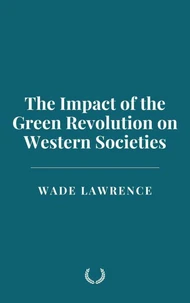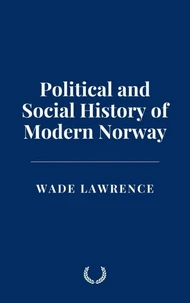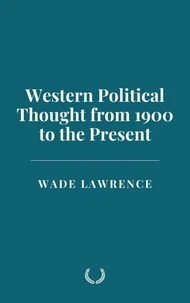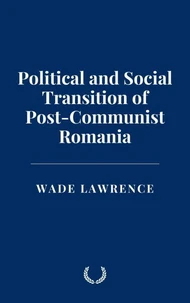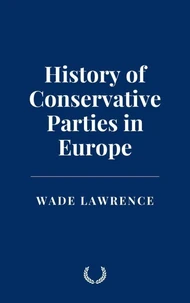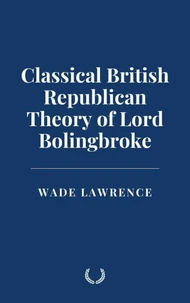Western European Politics in Modern Era
Par :Formats :
Disponible dans votre compte client Decitre ou Furet du Nord dès validation de votre commande. Le format ePub est :
- Compatible avec une lecture sur My Vivlio (smartphone, tablette, ordinateur)
- Compatible avec une lecture sur liseuses Vivlio
- Pour les liseuses autres que Vivlio, vous devez utiliser le logiciel Adobe Digital Edition. Non compatible avec la lecture sur les liseuses Kindle, Remarkable et Sony
 , qui est-ce ?
, qui est-ce ?Notre partenaire de plateforme de lecture numérique où vous retrouverez l'ensemble de vos ebooks gratuitement
Pour en savoir plus sur nos ebooks, consultez notre aide en ligne ici
- FormatePub
- ISBN8230214274
- EAN9798230214274
- Date de parution20/01/2025
- Protection num.pas de protection
- Infos supplémentairesepub
- ÉditeurIndependently Published
Résumé
This book provides an in-depth exploration of the political evolution of Western Europe from the post-World War II period to the 21st century, examining the complex historical, economic, and social forces that have shaped the region's political landscape. Divided into twenty chapters, the work covers a wide range of topics, from the origins of European integration, the rise of the European Union (EU), and the development of democratic institutions, to the challenges posed by nationalism, populism, and the changing global order.
Key themes include the rise of social democracy, the impact of the Cold War on European security, the development of welfare states, and the role of the EU in fostering economic cooperation and human rights. The book also delves into the rise of Green politics, the challenges of multiculturalism and immigration, the role of the EU in foreign policy, and the ever-growing importance of cybersecurity in the digital age.
In addressing contemporary issues, the book explores the legacy of the Cold War, the future of European democracy, and the growing geopolitical tensions with Russia, China, and the United States. It highlights the internal divisions within the EU, particularly in relation to sovereignty, migration, and economic policy, and discusses the rise of populist and nationalist movements across the continent.
The book argues that Europe's political future will depend on its ability to reconcile national sovereignty with collective action, uphold democratic values, and adapt to the rapidly evolving global challenges. Through detailed historical analysis and commentary on contemporary issues, it offers a comprehensive understanding of the complex forces shaping Europe's future in the global political arena.
Key themes include the rise of social democracy, the impact of the Cold War on European security, the development of welfare states, and the role of the EU in fostering economic cooperation and human rights. The book also delves into the rise of Green politics, the challenges of multiculturalism and immigration, the role of the EU in foreign policy, and the ever-growing importance of cybersecurity in the digital age.
In addressing contemporary issues, the book explores the legacy of the Cold War, the future of European democracy, and the growing geopolitical tensions with Russia, China, and the United States. It highlights the internal divisions within the EU, particularly in relation to sovereignty, migration, and economic policy, and discusses the rise of populist and nationalist movements across the continent.
The book argues that Europe's political future will depend on its ability to reconcile national sovereignty with collective action, uphold democratic values, and adapt to the rapidly evolving global challenges. Through detailed historical analysis and commentary on contemporary issues, it offers a comprehensive understanding of the complex forces shaping Europe's future in the global political arena.
This book provides an in-depth exploration of the political evolution of Western Europe from the post-World War II period to the 21st century, examining the complex historical, economic, and social forces that have shaped the region's political landscape. Divided into twenty chapters, the work covers a wide range of topics, from the origins of European integration, the rise of the European Union (EU), and the development of democratic institutions, to the challenges posed by nationalism, populism, and the changing global order.
Key themes include the rise of social democracy, the impact of the Cold War on European security, the development of welfare states, and the role of the EU in fostering economic cooperation and human rights. The book also delves into the rise of Green politics, the challenges of multiculturalism and immigration, the role of the EU in foreign policy, and the ever-growing importance of cybersecurity in the digital age.
In addressing contemporary issues, the book explores the legacy of the Cold War, the future of European democracy, and the growing geopolitical tensions with Russia, China, and the United States. It highlights the internal divisions within the EU, particularly in relation to sovereignty, migration, and economic policy, and discusses the rise of populist and nationalist movements across the continent.
The book argues that Europe's political future will depend on its ability to reconcile national sovereignty with collective action, uphold democratic values, and adapt to the rapidly evolving global challenges. Through detailed historical analysis and commentary on contemporary issues, it offers a comprehensive understanding of the complex forces shaping Europe's future in the global political arena.
Key themes include the rise of social democracy, the impact of the Cold War on European security, the development of welfare states, and the role of the EU in fostering economic cooperation and human rights. The book also delves into the rise of Green politics, the challenges of multiculturalism and immigration, the role of the EU in foreign policy, and the ever-growing importance of cybersecurity in the digital age.
In addressing contemporary issues, the book explores the legacy of the Cold War, the future of European democracy, and the growing geopolitical tensions with Russia, China, and the United States. It highlights the internal divisions within the EU, particularly in relation to sovereignty, migration, and economic policy, and discusses the rise of populist and nationalist movements across the continent.
The book argues that Europe's political future will depend on its ability to reconcile national sovereignty with collective action, uphold democratic values, and adapt to the rapidly evolving global challenges. Through detailed historical analysis and commentary on contemporary issues, it offers a comprehensive understanding of the complex forces shaping Europe's future in the global political arena.




